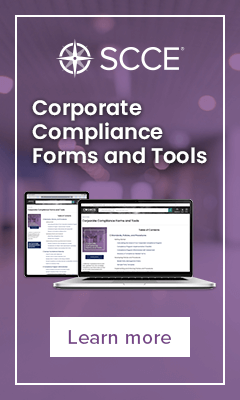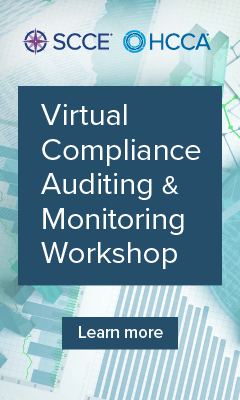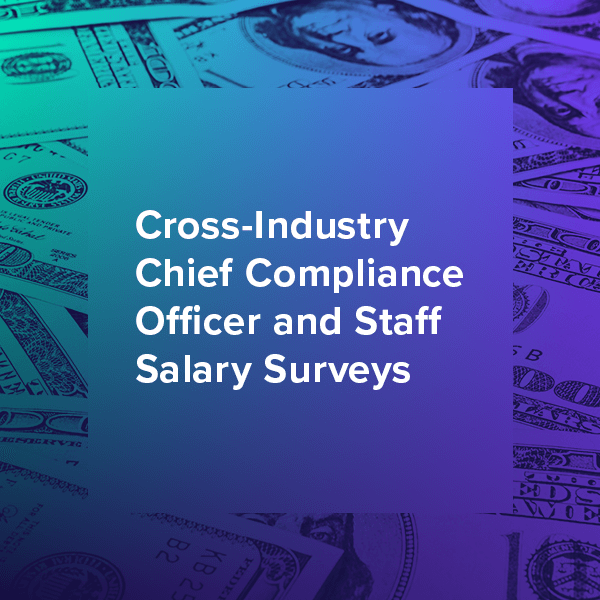Surveys
SCCE periodically surveys the compliance and ethics community on a variety of trending topics. Explore the results of these surveys by using the links below.
2023 Cross-Industry Compliance Staffing and Budget Benchmarking and Guidance Survey
Published: 01/09/2023
The tables in this 2023 report show how compliance staffing and budget compare across a number of factors, showing how compliance team size and budget differ by firm characteristics, allowing members to compare their own staff and budget levels to those of similar firms.
Read More2022 SCCE Salary Survey
Published: 10/17/2022
This survey contains the latest information about compensation for the healthcare compliance community. The results are now available for download. See how your compensation ranks based on title, organization size, years of experience, and other factors.
Read MoreSCCE & HCCA Exit Interview Survey
Published: 12/10/2021
Exit interviews can be a valuable tool for compliance professionals looking to protect their organizations—but how often is the compliance team really involved?
Read MoreCompliance and the COVID-19 Pandemic Survey
Published: 06/30/2020
To assess the impact of the COVID-19 pandemic on compliance programs the Society of Corporate Compliance and Ethics & Health Care Compliance Association fielded a survey in May 2020. Over 300 responses were received.
Read MoreSCCE’s 2020 Staffing and Budget Benchmarking Survey Report
Published: 03/01/2020
SCCE conducted a comprehensive survey of compliance professionals in order to create a salary survey. The survey looked at salaries in relation to measures such as size of company (in revenues and employees) as well as compliance budget and ownership structure. See how your team’s size and budget compare to others in the industry.
Read MoreSCCE 2019 Salary Survey
Published: 11/13/2019
Earlier this year, we surveyed compliance and ethics professionals on their compensation. As an SCCE member, you can do a custom report to see how your compensation compares. Select factors such as geography, company size, and more.
Read MoreThe Relationship between the Board of Directors and the Compliance and Ethics Officer
Published: 05/09/2018
To assess how the relationship between the compliance team and the board had evolved, as well as to examine issues of compliance officer influence, the Society of Corporate Compliance and Ethics and Health Care Compliance Association fielded this survey in 2014 and again in 2018.
Read More2018 Cross-Industry Compliance Staffing and Budget Benchmarking and Guidance Survey
Published: 02/14/2018
In 2017, the Society of Corporate Compliance and Ethics (SCCE) conducted a comprehensive survey of compliance professionals in order to create a salary survey. The survey looked at salaries in relation to measures such as size of company (in revenues and employees) as well as compliance budget and ownership structure. SCCE recognized that there would be an opportunity to reuse the data to create benchmarks for staffing and budget. The association then worked with the research provider to create the following report, which re-purposes the salary survey data.
Read More2017 Cross Industry Chief Compliance Officer and Staff Salary Surveys
Published: 11/16/2017
The Society of Corporate Compliance and Ethics (SCCE)® is pleased to be able to provide you with the 2017 Compliance and Ethics Officer Salary Survey report. As you will see, we have included data on compensation for both the chief compliance and ethics officer as well as for the compliance staff, giving a fuller picture of the compliance profession in one document.
Read MoreCompliance Training and the Board
Published: 10/13/2017
The relationship between the board and the compliance and ethics department has changed dramatically over the last several years, with more compliance professionals having at least a dotted line between them and the organization’s governing body. This is not coincidental, as several factors have converged to create a strong incentive for the board to grow more active in its oversight of compliance. First, the seemingly never-ending series of large settlements has underscored the risk to the organization for non-compliant and unethical behavior. Second, as more and more boards work directly with compliance, it’s more difficult for those who do not to justify their current practice.
Read More


